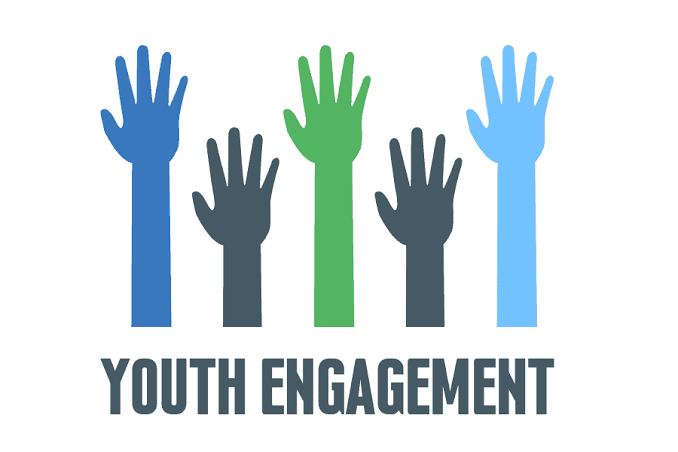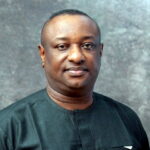By Ndidi Anyanwu
The future of peace undeniably lies in the hands of young people. With over 1.2 billion young people worldwide and over 600 million living in fragile and conflict-affected contexts, their role is crucial. As the world grapples with increasingly complex challenges, traditional peacebuilding methods must continually evolve to remain effective. This rapidly changing landscape demands innovative approaches and fresh perspectives. With their unique skills, energy, and diverse backgrounds, young people are significant partners in navigating and shaping this dynamic space. Nigeria boasts a significant and vibrant youthful demographic; about 70% of its population is under 30. This presents an unparalleled opportunity for fostering sustainable peace. Young Nigerians are not just future leaders; they are agents of change who bring fresh ideas, technological savviness, and a deep understanding of contemporary social dynamics. Their active participation in peacebuilding can lead to innovative solutions that address the root causes of conflict and build a more inclusive and resilient society.
Despite the increasing evidence of youth-peacebuilding nexus, young people’s role in peacebuilding has remained relegated to the background, overshadowed by traditional approaches and superficial inclusion that fail to harness youth’s full capacity as catalysts for sustainable peace. There needs to be a paradigm shift. This edition of the Nextier Policy Weekly calls for a fundamental change in how young people are engaged inpeacebuilding.
* Youth-Peace Nexus
Nigeria has been burdened by a complex web of violent conflicts for decades. These conflicts, ranging from communal clashes to ethnoreligious tensions, resource competition and insurgencies, have greatly influenced the country’s development. The social fabric has been strained, with communities polarised and trust eroded. Economic opportunities have been stifled, hindering growth and trapping many in poverty. The scars of these conflicts are evident in the physical destruction they have caused and the deep-seated societal divisions they have exacerbated. Data from Nextier’s Nigeria Violent Conflicts Database reveals that in 2023, 1,257 incidents, 1,878 kidnap victims and 4,377 casualties were recorded in Nigeria. In the first quarter of 2024 alone, 1,255 incidents and 244 casualties have already been documented. These violent incidents have led to the displacement of thousands of people and triggered a severe humanitarian crisis.
The youth often are perpetrators or victims at the heart of these conflicts. Gangs and insurgent groups have recruited many Nigerian youth due to factors such as poverty, unemployment, and lack of education. These groups exploit the young people’svulnerabilities, promising them financial incentives, protection, and a sense of belonging. Young people, on the other hand, often bear the brunt of violent conflicts, experiencing displacement, loss of family members, and psychological trauma. Many have been forced to flee their homes and live in Internally Displaced Persons (IDP) camps. The lack of access to quality education and livelihood opportunities exacerbates their vulnerability, further fuelling the cycle of poverty and violence, as marginalised youth may resort to violence for survival.
Despite their challenges, the youth have immense potential to contribute to peacebuilding. The young generation represents a powerful force for positive change. First, with their unique skills and backgrounds, young people are crucial partners in navigating the peacebuilding ever-changing terrain. One key strength is their technology savvy and extensive social networks.In recent years, the digital age has brought about significant changes in youth engagement and activism. The proliferation of social media platforms and digital communication tools has amplified youth voices, enabling them to connect, organise, and mobilise like never before. Through online platforms, young people can raise awareness, advocate for their rights, and demand accountability from authorities. Their digital activism has the potential to transcend geographical barriers, catalysing social movements and driving positive change on local, national, and even international scales. Their energy, creativity, and resilience in navigating the complexities of the digital landscape can reshape peacebuilding strategies, fostering greater inclusivity, responsiveness, and effectiveness in efforts to promote peace, reconciliation, and social cohesion.
Furthermore, young people bring innovation and open-mindedness to the table. Today’s conflicts are often multifaceted, involving new actors, technologies, and ideologies. Traditional approaches, like the emphasis on state-centrism and elders’ mediation, might not be adaptive enough to address these novel challenges. Young people are less bound by these traditional approaches and more willing to experiment with new ideas. This is invaluable in tackling evolving conflict dynamics, which require creative solutions to address the root causes of conflict in innovative ways. Furthermore, young people are often driven by a desire for a better world. This passion fuels their commitment to social change.
Young people’s contributions go beyond technology savvy and fresh ideas. Those living in fragile or conflict environments have a nuanced understanding of the cultural norms, social dynamics, and historical grievances that drive conflict. They have witnessed firsthand the impact of violence on their communities and have a personal stake in their communities’ future. This inherent understanding allows them to develop and tailor approaches that resonate with the community, which can be far more effective than imposing a bottom-down or a one-size-fits-all approach. In 2015, the United Nations Security Council adopted Resolution 2250 (UNSCR 2250) on Youth, Peace, and Security. This landmark resolution goes beyond acknowledging young people’s challenges in conflict zones. It recognizes their positive role as agents of peace, crucial partners in preventing violence, resolving conflicts, and rebuilding societies. The Resolution highlights the right of young people to participate in peacebuilding efforts at all levels. This means moving beyond tokenistic gestures and ensuring young people have seats and are part of decision-making. Their voices, perspectives, and experiences are vital for developing effective peacebuilding strategies.
* Barriers to Youth Engagement
While including young people in peacebuilding is crucial, several challenges limit their ability to engage and enact transformative changes. One of the most significant barriers include:
Adult-Centric Decision-Making: In many communities, leadership and decision-making positions are typically reserved for elders, with the assumption that age correlates with wisdom and experience. This entrenched belief system often sidelinesyounger individuals, regardless of their capabilities or innovative ideas. Moreover, traditional peacebuilding initiatives often maintain top-down structures, where decision-making power rests primarily with adults. This limits the ability of young people to contribute their fresh perspectives and innovative ideas to peacebuilding strategies.
Stereotypes and Marginalisation: Historically, youth in Nigeria have often been viewed through a lens of suspicion, prejudice, and negative stereotypes. They are frequently depicted as prone to violence, radicalisation, or apathy, perpetuating their exclusion from meaningful participation in decision-making. Such marginalisation not only undermines the contributions of young people but also reinforces existing power imbalances and hampers efforts to build inclusive and resilient communities. In some instances, they are stereotyped as lacking experience or too idealistic. These stereotypes can be pervasive even among established peacebuilding actors. Preconceived notions about young people’s capabilities can undermine their credibility and make it difficult for them to be taken seriously.
Tokenistic Inclusion: Some initiatives establish quotas for youth participation in committees or leadership structures. However, these quotas often translate to symbolic representation without real authority to influence decisions. Youth are frequently seen as participants in symbolic gestures, such as workshops or conferences, with limited decision-making power. This tokenistic approach undermines the genuine inclusion of youth by merely checking a box rather than having their perspectives in the decision-making process. As a result, young people may become disillusioned with these initiatives, feeling that their voices are not truly valued. This accounts for why most youth-focused conferences are dominated by older men and women or an advanced person leading a youth group. Even when policies push for youth inclusion, an example is the Not-Too-Young-To-Run Act, party politics and economic challengesstifle youth inclusion. The Not Too Young to Run Act (NTYTRA), signed into law in 2018, marked a significant turning point for Nigerian youth and their political participation. Before this act, the age requirements for various political positions excluded many young Nigerians from running for office.
Lack of Funding and Resources: Youth-led peacebuilding initiatives often face a significant funding gap. Traditional donors and institutions might be hesitant to invest in projects led by young people, perceiving them as inexperienced or lacking credibility. This lack of resources restricts the reach and impact of youth-led initiatives, limiting their ability to implement innovative solutions and truly transform conflict dynamics.Youth unemployment and poverty also limit young people’s engagement in peacebuilding. More time is spent striving to earn a living or find limited job opportunities.
Socio-Economic Challenges: Young people often face significant socio-economic barriers that hinder their involvement in peacebuilding activities. High rates of unemployment and poverty among youth can limit their ability to participate in peacebuilding initiatives. Economic instability often forces young people to prioritie immediate survival over long-term engagement in community and peace efforts. Moreover, traditional donors and institutions might be hesitant to invest in projects led by young people, perceiving them as unreliable, inexperienced or lacking credibility. This lack of resources restricts the reach and impact of youth-led initiatives, limiting their ability to implement innovative solutions and truly transform conflict dynamics.
* Moving Forward: Creating Space for Youth Leadership
To overcome these challenges and unlock the transformative power of young people in peacebuilding, a multi-pronged approach is needed:
• Peacebuilding initiatives by government and civil society groups need a paradigm shift, moving from top-down to more inclusive models. This means creating spaces for young people to participate meaningfully in decision-making, ensuring their voices are heard and valued. This could involve establishing functional youth councils, integrating young representatives into existing peacebuilding committees, or creating dedicated platforms for youth-led discussions and strategy development.
• Investment in programmes that equip young people with the necessary skills and knowledge to be effective leaders in peacebuilding. Mentorship opportunities from experienced peacebuilders can bridge the gap between youthful idealism and practical experience. Additionally, recognising young people’s expertise and valuing their unique perspectives can further bolster their confidence and credibility.
• Establish funding streams specifically dedicated to supporting youth-led peacebuilding projects. This can involve creating grant programmes or encouraging private-public partnerships that invest in young people’s innovative solutions. Additionally, promoting knowledge-sharing and collaboration between young peacebuilders can help them leverage resources more effectively and maximise their impact.
• Collaborative approaches between youth-focused government ministries, universities, CSOs, and INGOs are needed to establish mentorship programmes that connect young peacebuilders with experienced mentors. This can be done through formal programmes, online platforms, or peer-to-peer mentorship initiatives within youth peacebuilding organisations. Mentorship allows young people to learn valuable skills and gain insights from seasoned practitioners, while experienced actors can benefit from the youth’s fresh perspectives and energy.
• Peacebuilding efforts should actively seek the participation of young people from diverse socio-economic backgrounds. This can involve outreach programs, targeted capacity-building initiatives, and creating safe spaces for marginalised voices to be heard.
• Moreover, dismantling the systemic barriers that prevent youth from having a meaningful impact is crucial. Age discrimination and the tendency of established leadership to overlook or undervalue young people’s ideas are significant hurdles. The government can introduce policies that encourage youth participation beyond quotas. These could include reserved funding for youth-led initiatives or programmes incentivising community structures and political parties to include young candidates. CSOs should also continue to raise awareness about the importance of youth participation and advocate for policies that remove systemic barriers. Overall, a multi-pronged approach beyond quotas is necessary for true youth inclusion. By investing in capacity building, shifting mindsets, and creating supportive structures, young Nigerians can make a genuine and impactful contribution to shaping the nation’s future.
• The government needs to address young people’s challenges, such as limited access to education and economic opportunities. By addressing the socio-economic challenges young Nigerians face, the government creates a more just and equitable society and builds a foundation for lasting peace. Empowering young people allows them to overcome feelings of marginalisation and hopelessness and gives them a stake in the future of their nation. This empowered generation can become the bridge builders, bringing together communities divided by conflict and laying the groundwork for a more peaceful and prosperous future for all Nigerians.
* Policy Recommendations
1. Peacebuilding initiatives by government and civil society groups need a paradigm shift, moving from top-down to more inclusive models.
2. There is a need to invest in programmes that equip young people with the necessary skills and knowledge to be effective leaders in peacebuilding.
3. There is a need to establish funding streams specifically dedicated to supporting youth-led peacebuilding projects.
4. Collaborative approaches between youth-focused government ministries, universities, CSOs, and INGOs are needed to establish mentorship programmes that connect young peacebuilders with experienced mentors.
5. Peacebuilding efforts should actively seek the participation of young people from diverse socio-economic backgrounds.
6. It is crucial to dismantle the systemic barriers preventing youth from having a meaningful impact.
7. The government needs to address young people’s challenges, such as limited access to education and economic opportunities.
Every generation inherits a world in flux. Technological advancements, ‘new wars’, evolving social norms, and emerging global challenges continuously reshape our realities. To secure a future where peace endures, adapting new strategies and meaningfully engaging with young people is important. Investing in youth is not just about having them at the table; it’s about recognising them as agents of change. It’s about providing them with the resources, skills, and platform to contribute meaningfully to building a more peaceful future for all. This is a call to action for governments, international organisations, civil society groups, and established peacebuilders. By fostering a culture of transformative youth engagement, we unlock a reservoir of creativity, innovation, and context-specific solutions capable of addressing the multifaceted challenges confronting our world today.
(Ndidi Anyanwu is a Policy and Research Consultant at Nextier.)



